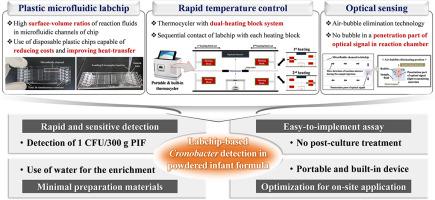当前位置:
X-MOL 学术
›
Int. J. Food Microbiol.
›
论文详情
Our official English website, www.x-mol.net, welcomes your
feedback! (Note: you will need to create a separate account there.)
Labchip-based diagnosis system for on-site application: Sensitive and easy-to-implement detection of single recoverable Cronobacter in infant formula without post-enrichment treatment.
International Journal of Food Microbiology ( IF 5.0 ) Pub Date : 2020-05-11 , DOI: 10.1016/j.ijfoodmicro.2020.108659 Tae Jin Cho 1 , Hye Won Kim 2 , Changhoon Yoo 3 , Sung Woo Kim 3 , Min Suk Rhee 2
International Journal of Food Microbiology ( IF 5.0 ) Pub Date : 2020-05-11 , DOI: 10.1016/j.ijfoodmicro.2020.108659 Tae Jin Cho 1 , Hye Won Kim 2 , Changhoon Yoo 3 , Sung Woo Kim 3 , Min Suk Rhee 2
Affiliation

|
Microfluidic labchips have achieved much advancement in the molecular diagnosis of foodborne pathogens. Whereas difficulties in the flow control during the transportation of liquid fluids can occur and should be overcome. Manipulations of reaction temperature and the complex procedures from sample pre-treatment to analysis in a single chip device are major obstacles for the on-site application. Thus, the efficient temperature control of samples without any flow of reaction fluids in microfluidic channels of plastic chip and the simplest protocol omitting post-enrichment processing steps may overcome these limitations represented by the stability and the complexity, respectively. This study aims to develop a novel type of labchip and thermocycler specialized for the gene amplification in microfluidic channels and to evaluate the detectability by sensing the minimum recoverable level of Cronobacter in powdered infant formula (PIF). We developed a thermocycling device accelerating reactions through dual heating-blocks optimized to control temperatures of samples in microfluidic-channels by direct contact with labchip sequentially and repetitively. The structural design of microfluidic channels was to eliminate interference factors associated with the optical detection of fluorescent signals (without distortion due to air bubbles in the reaction chamber). To improve the applicability, a portable device and simplified operation to allow direct loading of samples in the chip without post-enrichment procedures were also adopted. Detection performance was evaluated by a sensitivity/specificity tests using 50 isolates of Cronobacter. Cross-reactivity tests for non-Cronobacter organisms and gDNA [human, raw materials of PIF (cow, soybean)] showed that there was no interference-factor causing false-positive results. In terms of the applied research conducted by using PIF, the enrichment of samples without broth medium (distilled water) displayed outstanding performance and 12 h of incubation facilitated detecting target at concentration as low as 1 CFU/300 g PIF (as initial contamination level) without post-enrichment treatment. Validation of the operation conditions using 30 commercial PIF products was also consistent. The present study presents a novel approach of microfluidic technology with perspective to not only the performance and the practicability [easy-to-implement protocol, portable materials, cost-effectiveness (the use of a miniaturized plastic chip requires a minimum level of materials)] for on-site diagnosis.
中文翻译:

基于Labchip的现场诊断系统:无需进行浓缩后处理即可灵敏,易于实现的婴儿配方奶粉中单个可回收的克罗诺杆菌的检测。
微流体实验室芯片在食源性病原体的分子诊断中取得了很大进步。然而,在液体流体的运输过程中,在流量控制上可能会出现困难,应予以克服。在单芯片设备中,反应温度的控制以及从样品预处理到分析的复杂程序是现场应用的主要障碍。因此,在塑料芯片的微流体通道中没有反应流体的任何流动的情况下,样品的有效温度控制以及省略了富集后处理步骤的最简单方案可以分别克服以稳定性和复杂性为代表的这些限制。这项研究的目的是开发一种新型的Labchip和热循环仪,专门用于微流体通道中的基因扩增,并通过感测婴儿配方奶粉(PIF)中克罗诺杆菌的最低可回收水平来评估可检测性。我们开发了一种热循环装置,该装置通过双加热块来加速反应,该加热块经过优化,可通过与Labchip顺序且重复地直接接触来控制微流体通道中样品的温度。微流体通道的结构设计是为了消除与荧光信号光学检测相关的干扰因素(没有由于反应室中的气泡引起的失真)。为了提高适用性,还采用了便携式设备和简化的操作以允许将样品直接加载到芯片中,而无需进行后富集程序。通过使用50种克罗诺杆菌菌株的敏感性/特异性测试评估检测性能。对非克罗诺杆菌生物和gDNA [人,PIF的原料(牛,大豆)]的交叉反应测试表明,没有干扰因素会导致假阳性结果。就使用PIF进行的应用研究而言,没有肉汤培养基(蒸馏水)的样品的富集表现出出色的性能,孵育12小时有助于检测低至1 CFU / 300 g PIF(作为初始污染水平)的靶标无需进行后浓缩处理。使用30种商用PIF产品对操作条件的验证也是一致的。
更新日期:2020-05-11
中文翻译:

基于Labchip的现场诊断系统:无需进行浓缩后处理即可灵敏,易于实现的婴儿配方奶粉中单个可回收的克罗诺杆菌的检测。
微流体实验室芯片在食源性病原体的分子诊断中取得了很大进步。然而,在液体流体的运输过程中,在流量控制上可能会出现困难,应予以克服。在单芯片设备中,反应温度的控制以及从样品预处理到分析的复杂程序是现场应用的主要障碍。因此,在塑料芯片的微流体通道中没有反应流体的任何流动的情况下,样品的有效温度控制以及省略了富集后处理步骤的最简单方案可以分别克服以稳定性和复杂性为代表的这些限制。这项研究的目的是开发一种新型的Labchip和热循环仪,专门用于微流体通道中的基因扩增,并通过感测婴儿配方奶粉(PIF)中克罗诺杆菌的最低可回收水平来评估可检测性。我们开发了一种热循环装置,该装置通过双加热块来加速反应,该加热块经过优化,可通过与Labchip顺序且重复地直接接触来控制微流体通道中样品的温度。微流体通道的结构设计是为了消除与荧光信号光学检测相关的干扰因素(没有由于反应室中的气泡引起的失真)。为了提高适用性,还采用了便携式设备和简化的操作以允许将样品直接加载到芯片中,而无需进行后富集程序。通过使用50种克罗诺杆菌菌株的敏感性/特异性测试评估检测性能。对非克罗诺杆菌生物和gDNA [人,PIF的原料(牛,大豆)]的交叉反应测试表明,没有干扰因素会导致假阳性结果。就使用PIF进行的应用研究而言,没有肉汤培养基(蒸馏水)的样品的富集表现出出色的性能,孵育12小时有助于检测低至1 CFU / 300 g PIF(作为初始污染水平)的靶标无需进行后浓缩处理。使用30种商用PIF产品对操作条件的验证也是一致的。











































 京公网安备 11010802027423号
京公网安备 11010802027423号